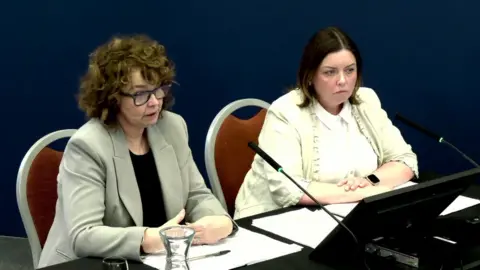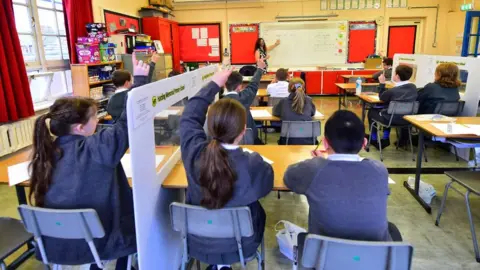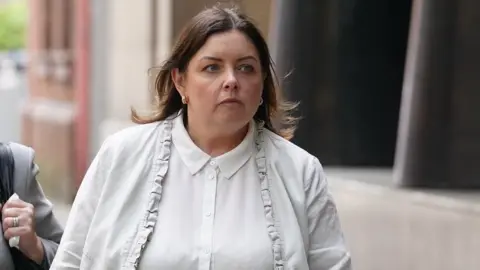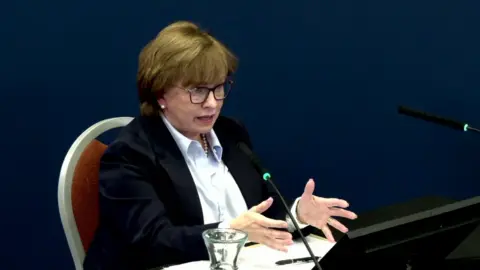Covid Inquiry: Sinn Féin minister 'accepts' she should not have gone to Storey funeral
 BBC
BBCA former Sinn Féin minister has said she accepts now that she should not have attended a controversial funeral during the Covid pandemic.
Carál Ní Chuilín was Communities Minister from June 2020 until December that year.
She appeared before the UK Covid-19 public inquiry on Wednesday.
She was among a group of senior Sinn Féin politicians who attended the funeral of republican Bobby Storey in June 2020.
The gathering was criticised at the time as being in breach of Covid rules.
She was asked by Brenda Campbell KC, representing the Covid-19 bereaved families in Northern Ireland about her attendance at the funeral.
Ms Ní Chuilín told the inquiry she was "very sorry" and that attending the funeral had an impact on public confidence.
She also said she accepted she should not have attended the funeral using her ministerial car, and had later reimbursed the costs to the department.
But Ms Campbell added: "Do you accept you should not have gone to the funeral at all given your role as minister for communities?"
Ms Ní Chuilín replied: "I can see the hurt and the anger and I accept that now... yes I do."
Former Education Minister Peter Weir also gave evidence on Wednesday.
He said he regrets that the debate over closing schools in Northern Ireland at the onset of the Covid pandemic created political division.
Lord Weir, a former DUP MLA, was Stormont's education minister from January 2020 until mid-2021.
He said debate within the Northern Ireland Executive over closing schools created a "level of division".
The context for closing schools, the inquiry was told, was in mid-March 2020, days before the UK government announced a national lockdown.
On 12 March 2020, the Irish government announced that it would close all schools in the Republic of Ireland.
But the inquiry heard that the Stormont Executive met on 16 March where disagreement between ministers broke out over whether to follow suit.
'Antipathy' towards Conservative government
Lord Weir said he took the view that ministers should be following scientific and medical advice, which at that point did not recommend shutting down all schools.
But he said Sinn Féin and Social Democratic and Labour Party (SDLP) ministers had "one eye towards what was happening in the Republic of Ireland".
"There was a little bit of an element... the situation was that not only would they want to follow the Republic of Ireland, but there was a natural inclination not to follow what was happening in London," he said.
Lord Weir also suggested those ministers held a "level of antipathy" against the Conservative government under Boris Johnson.
 Pacemaker
PacemakerThe inquiry was shown handwritten notes from that meeting which showed divisions behind the scenes between the parties.
Lord Weir was asked by inquiry counsel Clair Dobbin KC how well children in Northern Ireland were being served when it came to the decision over closing schools, asking whether it had become "political and divisive".
He replied: "I regret it became that, I felt there had been a level of consensus a few days before.
"Others wanted to take it in a different direction.
"At various levels it may have been seen as being directly political."
Asked about notes provided to the inquiry about "confusion" about public messaging on schools at that point, Lord Weir said the executive's position had initially been joined up, prior to the Irish government closing schools.
But he said that changed "within 24 hours" when the then-Deputy First Minister Michelle O'Neill did a press interview calling for schools in Northern Ireland to close immediately.
Lord Weir also said that once the UK Government announced that schools in England were closing, advice from health officials at Stormont also changed and that schools in Northern Ireland should shut.
He acknowledged that it was "doable at that stage", with furlough schemes and finances available from Westminster to help support parents with childcare.
'Disappointed' by text message
Former Communities Minister Deirdre Hargey disputed a text message that claimed she showed "no interest in Covid" prior to mid-March 2020.
Details of the text were revealed during evidence to the Covid-19 inquiry by counsel Leah Treanor.
She said the then-head of the civil service Sir David Sterling sent the message to another official, Chris Stewart, on 10 March 2020.
Ms Hargey, a Sinn Féin MLA, said it was not her reflection of the time.
 PA Media
PA MediaThe text from Sir David read: "I spoke to Tracey earlier, she's briefing her minister (who has shown no interest in Covid up to now) tomorrow."
It referred to Tracey Meharg, who was the top civil servant in the Department for Communities then advising Ms Hargey.
Asked by inquiry counsel if that was a fair assessment, Ms Hargey said she was "disappointed" to have seen the text message and its contents.
She said she had spoken an executive meeting on that date and was looking at contingency plans for her department as well as how to support key sectors.
"We would have been planning at the start of March and late February for that to happen, so I am disappointed at that text message. I don't think it reflects where we were or conversations I had with Tracey Meharg," she added.
Ms Hargey was Stormont's communities minister from January 2020 until June that year, before stepping aside temporarily due to illness.
Her party colleague Carál Ní Chuilín filled in during that period of sickness until December 2020 when Ms Hargey returned to work.
Storey funeral 'damaged relations'
Former DUP Economy Minister Diane Dodds also appeared at the inquiry on Wednesday.
She was asked about the impact of the funeral of republican Bobby Storey on the public adhering to Covid restrictions.

Mrs Dodds said the event "damaged relations" within the executive.
"It was really difficult to then stand at another press conference and say to the public, 'we're going to allow you to do this', when all of this had taken place just a few days before it."
